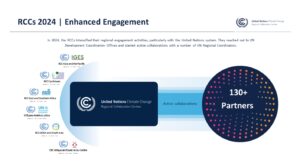 In 2024, the UNFCCC’s Regional Collaboration Centres (RCCs) significantly advanced global climate action by providing technical assistance, capacity-building, and fostering strategic partnerships to support countries in meeting their Paris Agreement commitments.
In 2024, the UNFCCC’s Regional Collaboration Centres (RCCs) significantly advanced global climate action by providing technical assistance, capacity-building, and fostering strategic partnerships to support countries in meeting their Paris Agreement commitments.
Key Achievements:
- Nationally Determined Contributions (NDCs) 3.0: RCCs played a pivotal role in assisting countries with the development and submission of their updated NDCs, offering tailored training and policy guidance to align national efforts with global climate goals.
- Article 6 Implementation: They facilitated countries’ participation in cooperative approaches under Article 6 of the Paris Agreement, promoting international collaboration to reduce greenhouse gas emissions.
- Adaptation Support: RCCs enhanced support for the formulation and implementation of National Adaptation Plans (NAPs), conducting regional capacity-building activities and dialogues in countries like Chad, Sierra Leone, Eritrea, Tanzania, and Uganda.
- Multi-Stakeholder Collaboration: Engaging with civil society, the private sector, youth, and other non-Party stakeholders, RCCs integrated diverse perspectives into climate processes. Notably, RCC Latin America partnered with organizations such as the Center for Clean Air Policy (CCAP) and regional sugar producers to develop platforms addressing Article 6.
- Event Organization: Throughout the year, RCCs organized or co-organized 216 events including NDC forums and regional dialogues on carbon pricing facilitating knowledge exchange and capacity-building across various regions.
UN Climate Change Executive Secretary Simon Stiell emphasized that RCCs are central to global climate efforts, stating they “provide technical assistance to countries, facilitate the sharing of knowledge and good practices, deliver training and organize hands-on support.”
These initiatives underscore the RCCs’ commitment to bridging regional climate actions with global ambitions, ensuring that diverse stakeholders are equipped and engaged in the collective response to the climate emergency.
Source: UNFCCC
